Advertisements for Myself...and My Friends
"I may be wrong, and if I am, then I'm the fool who will pay the bill..." --- Norman Mailer
"It's somebody talking in a saloon and people think it's important!" --- Jimmy Breslin, on blogs
Thursday, June 23, 2011
Saturday, June 11, 2011
Monday, February 11, 2008

It's somebody talking in a saloon and people think it's important!
The great Jimmy Breslin at Barnes & Noble Lincoln Square, February 5, 2007.
If you want to know what New York has lost, think about a city where JB was its voice. Today, the voice of the city is the twentysomething at your bank branch who turns down your loan.
Monday, November 12, 2007

--- Norman Mailer
 I would certainly be remiss if I did not mark the passing of the man who was an inspiration in so many ways (not the least of which is the title of the blog).
I would certainly be remiss if I did not mark the passing of the man who was an inspiration in so many ways (not the least of which is the title of the blog).His accomplishments are well-known (two Pulitzers, a National Book Award, mind-altering essays, countless best-sellers, etc etc), as are his low points (stabbing his wife with a penknife, the Jack Henry Abbott affair, Town Bloody Hall), and they have been, and will be, better documented elsewhere. But they miss the most important statement of Norman Mailer’s life.
Norman Mailer was a writer. He was all that, and he was more than that.
He was a Writer.
He was unashamed of it. He embraced the heroism of it. And he went balls-to-the-wall with it.
If you are a writer, you can feel important, you can feel ego-inflated, you can occasionally feel
 gratified. But if you are a writer, and you listened to or spoke with Norman for any amount of time, you felt… heroic. Like part of a secret, endowed clan that was called upon to move off into hopeless quests that had to be undertaken anyway, or moreso, had to be undertaken because they were hopeless.
gratified. But if you are a writer, and you listened to or spoke with Norman for any amount of time, you felt… heroic. Like part of a secret, endowed clan that was called upon to move off into hopeless quests that had to be undertaken anyway, or moreso, had to be undertaken because they were hopeless.In Advertisements for Myself, Norman Mailer said he would settle for nothing less than changing the consciousness of his times. A heroic quest. Norman pointed to the farthest fence, picked up his biggest bat, and took his mightiest swing. Sometimes he connected. Sometimes he whiffed. Some went over the fence, some went into the stratosphere, some went off the wall for a double (and some went off the wall in other ways). But he always took the biggest cut he could and no matter what happened, he still strode to the plate every time up eying nothing but that fence.
And what he taught is what, if you are a writer, could be the most important lesson to learn: you must be absolutely, totally, completely unafraid to fail. Because fail you will at times. But there is something worse than failing, and that’s not taking your turn at bat.
I had seen him speak many times, all when he had passed eighty, but even as I could see him turning frail, his mind was still sharp. We spoke briefly and shook hands at a reading/signing of Castle in the Forest. And we had one encounter in our neighborhood in Brooklyn Heights:
Not too long after we, too, moved here from the Village, my pregnant wife woke up around seven on a Sunday morning famished. So I threw on some scurffy clothes and went out to get us some bagels. I get outside and look up Clark Street and I see a guy, older, wild hair, scruffy chinos, making his way up the block with a very pronounced limp. I’m thinking it’s some guy who woke up on a bench and is just making his way, until I get about half a block behind the guy and I realize “holy s***, that’s Mailer!” So now I’m getting closer and closer up behind him and I’m thinking jees, what do I do when I pass him? I gotta do something, but the wrong thing would just ignite that famous temper. So I give him a wide berth as I pass, then I turn a little to the right and say, “Good morning, Mr. Mailer.” And he looks up at me like Popeye, regards me for a second, then says, in that great inimitable voice, “HOWAAREYA??!” I just said, “Fine, sir” and we nodded and went on our ways.
He had the courage to fail if he could fail brilliantly, and the audacity to risk success if success could make others think and feel in new and different ways. In this, he was the epitome of the artist and the writer. He is a model for all that come after. And in the age of plastics and too much technology, it was his authenticity that made him more and more unique.
Friday, February 09, 2007
What better day than Valentine's Day to learn
The Truth About Love?
OPENING ON VALENTINE'S DAY
for FIVE PERFORMANCES ONLY
The Truth About Love is set in 1958 Philadelphia. On the idyllic Penn campus one hot summer, Rachel sees Mark and Mark sees Rachel and they fall in love. But for Rachel, 'the truth' about love is that it makes her see only a beautiful light at the end of a tunnel, not the locomotive speeding towards her. The Truth About Love is Our Town, if Emily was bewitched and bewildered—and George was gay.
The Truth About Love is funny, touching, absorbing drama, brilliantly written and brilliantly staged. It's the first collaboration of Susannah Nolan, who's equally brilliant Don't Pick Up is now being performed around the country after being named Best Play in the 2002 American Globe Festival, and Christine Simpson, on of nytheater.com's Dowtown Theater People Of The Year and fresh from her Theater Row triumph The Great Conjurer. The Truth About Love will be another downtown triumph.
- Tickets are available at SmartTix or at the Manhattan Theater Source on 177 Macdougal (btween 8th St and the Park) .

SUSANNAH NOLAN is the author of Don’t Pick Up, which won the American Globe Theatre's 2002 Fifteen Minute Play Festival and was also staged at New Dramatists and published in the Guthrie Theatre’s anthology The Best Ten-Minute Plays for 2 Actors: 2004 (Smith & Kraus) and is now performed around the country. Some of her other works include Fed Up to Here (finalist, Samuel French off-Broadway Playwrights Festival 1992), The Man with David’s Face (part of “Bi-Polar Expeditions” at Synchronicity Space) and No Time To Change Clothes (presented as part of THAW Out for Peace @ Collective Unconscious).
 CHRISTINE SIMPSON is a Korean-American writer/director based in Manhattan. She was recently named one of nytheatre.com's People of the Year for 2006. As a director, Ms. Simpson has directed with Ma-Yi Theatre Company, New Georges, Reverie Productions, Peculiar Works Project, Bumblebee & Blackbird Productions, The Public Theater, the NYC International Fringe Festival, Fluid Motion Theater & Film, and Happy Lady Productions. Plays penned by Ms. Simpson have been produced at the Blue Heron Theatre, Baruch Performing Arts Center, the New York City International Fringe Festival (2003 and 2006), and Theatre Row. She has also written and directed two short films that have screened globally. In 2005, she was selected as one of five filmmakers to compete in the Asian American International Film Festival Michelob Light Music Video Contest.
CHRISTINE SIMPSON is a Korean-American writer/director based in Manhattan. She was recently named one of nytheatre.com's People of the Year for 2006. As a director, Ms. Simpson has directed with Ma-Yi Theatre Company, New Georges, Reverie Productions, Peculiar Works Project, Bumblebee & Blackbird Productions, The Public Theater, the NYC International Fringe Festival, Fluid Motion Theater & Film, and Happy Lady Productions. Plays penned by Ms. Simpson have been produced at the Blue Heron Theatre, Baruch Performing Arts Center, the New York City International Fringe Festival (2003 and 2006), and Theatre Row. She has also written and directed two short films that have screened globally. In 2005, she was selected as one of five filmmakers to compete in the Asian American International Film Festival Michelob Light Music Video Contest.
Monday, March 27, 2006
A New Play by Timothy Nolan
"I am so into you, I can't think of nothin' else…"
Sometimes it feels like she's right there.
The sun rises. The city rouses from its heavy sleep. The light creeps in like an unwanted intruder. The remnants of the night before are strewn about the room: a drained glass…a crumpled pile of sheets. A radiator taps out the seconds of his life that are ticking away. When he woke up this morning, he saw he was alone. So he decided not to be.
This short play written by Timothy Nolan, performed by Michael Chimenti, and illustrated by Jodi Chamberlain, has found it's way into an unusual type of animation.
She's So Beautiful marries both the complex dialog of adult culture with the lush but simple nature of illustrated line.
Wednesday, August 03, 2005
I had just loaded up our camera with four fresh batteries and a brand new 256mb memory card. We had 300 pictures to play with. I figured it was safe, and would be interesting, to let Olivia wander around the Louvre with the camera and see what she turned up with.




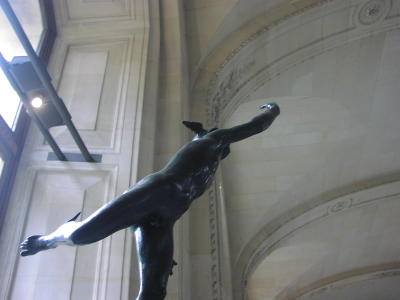
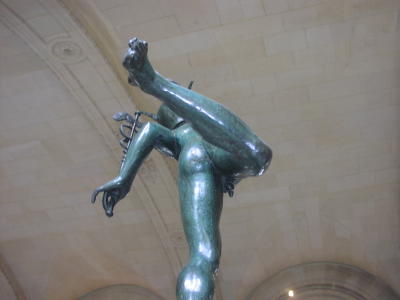


 Sense a theme developing here?
Sense a theme developing here? 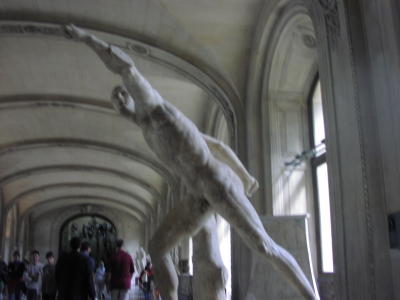
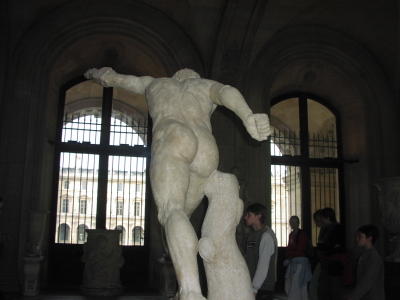
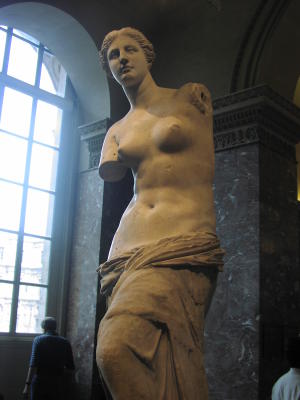
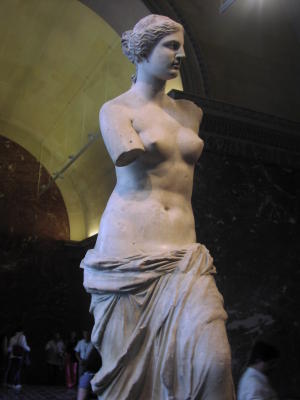
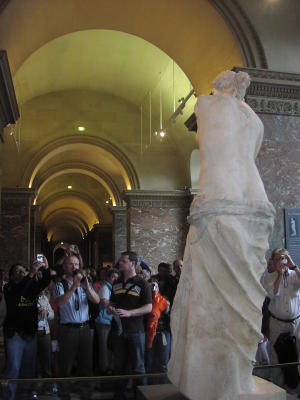 "What the Venus de Milo has to look at every day."
"What the Venus de Milo has to look at every day."


